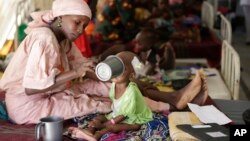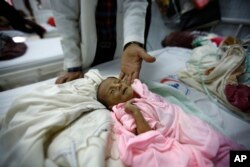The United Nations Children’s Fund says about 1.4 million children face death from starvation in Nigeria, Somalia, South Sudan and Yemen.
UNICEF issued the warning with an appeal to the world for help to feed these children.
Anthony Lake is UNICEF’s executive director. He said, “Time is running out. We must not repeat the tragedy of the 2011 famine in the Horn of Africa.”
The UN reported that 260,000 people lost their lives in that famine.
Lake described the famine and malnutrition in the four nations today as “largely man-made.”
UNICEF reports more than 250,000 children South Sudan are severely malnourished. It says hundreds of thousands more are at risk of the same. South Sudan is experiencing the worst hunger situation since civil war began there in 2013.
Famine has been officially declared in two areas of Unity State. Challiss McDonough is spokesperson for the World Food Program in East Africa.
“You have got nutrition rates that are astronomical, you have got people with very limited access to food, the mortality rate is above the level that’s required, so they have announced that although you have got a bad food security situation throughout the country, that in those two specific counties, things are about as bad as they can get.”
McDonough and other UN officials blame the continued civil war in South Sudan, along with a collapsing economy, high food prices and low agricultural production.
“If we had peace and could work on agricultural development, then yes, in the long run, there is enormous potential for South Sudanese agriculture. But you can't farm when you are fighting, or you can't farm when it is not safe to go into your fields because somebody else is fighting.”
The United Nations said 450,000 children in northeast Nigeria are also facing severe malnutrition. The Famine Early Warning System Network, or FEWS NET, said attacks by Boko Haram militants have made it hard to transport food.
In Yemen, UNICEF says it is providing help for 320,000 children, but that much more help is needed. FEWS NET says the continuing military conflict there has interfered with food supplies.
The U.N. estimates that half of Somalia's population, 6.2 million people, is threatened by drought following two failed rainy seasons. It says Puntland and Somaliland are the hardest hit areas.
UNICEF said children were the country’s most vulnerable people.
A UNICEF spokesman said the number of young suffering from severe acute malnutrition in Somalia "is expected to rise to 270,000 in the next few months."
Farm animals are dying in large numbers. In Somaliland, the drought has killed more than 10 million goats and sheep.
Farmer Mohamud Ibrahim Yassin says few of his 150 animals can make the 20-kilometer walk from his farm to water. He says most are too weak to complete the walk and are too skinny to sell.
“If we get rain, they will survive, but if there is no rain, I don’t think they will survive,” he said.
I’m Caty Weaver.
Bruce Alpert adapted this story for Learning English from reports by Jason Patinkin and Jill Craig for VOANews. Caty Weaver was the editor.
We want to hear from you. Write to us in the Comments Section and share your views on our Facebook Page.
____________________________________________________________
Words in This Story
famine - n. a situation in which many people do not have enough food to eat
disrupt -- v. to interfered with normal activities
shortage - n. not enough
county - n. an area of a state or country that is larger than a city and has its own government to deal with local matters
enormous - adj. very large
potential - n. capable of becoming real
skinny - adj. too thin






